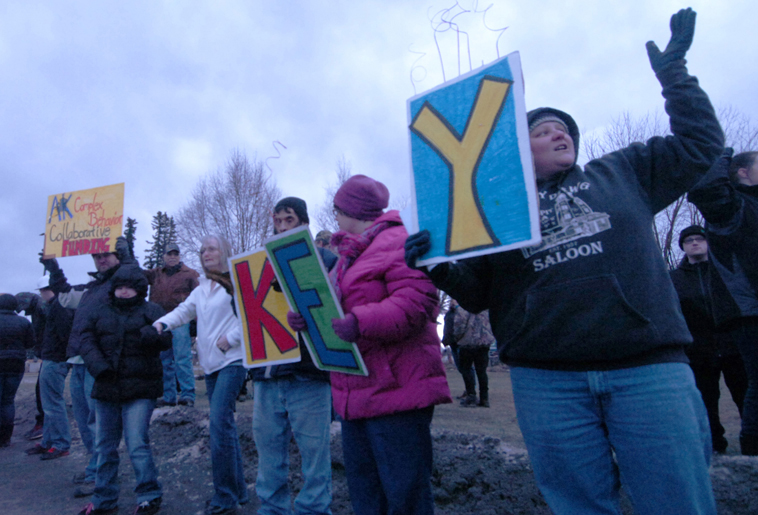The local chapter of the Key Coalition, a group advocating on behalf of people seeking state aid for developmental disabilities, held its annual rally on Friday at Soldotna Creek Park. Volunteer organizer Lynette Haas of Hope Community Resources, one of the Coalition’s member groups, said that approximately 70 people came to demonstrate with signs and cheers by the side of Sterling Highway between noon and 12:40 p.m.
Haas said that the annual Key Rally demonstrations have taken place “since 1988, when services got cut … and (health) agencies didn’t have anything to fall back on.”
“It was that year that a bunch of agencies decided to form the Key Coalition so we could talk to the legislators and explain how important services were in the communities,” Haas said.
In addition to organizing statewide public awareness demonstrations, the Key Coalition also sent members to Juneau to give a presentation to the House Health and Human Services committee. The presentation to the House committee outlined three actions the Key Coalition seeks from the state legislature: to create and implement a cost-savings plan for disability services, maintain the Medicaid waiver program, and eliminate the long wait-list of individuals seeking access to services without receiving them.
According to the Key Coalition’s 2015 Legislative Priorities document, the Medicaid waiver program allows individuals to receive care in their homes through community organizations, rather than requiring them to be placed in an institution. Haas said that community-integrated care is preferable to institutionalized care for both financial and human reasons.
“The cost savings of having services in the community is much cheaper than having somebody in an institution,” Haas said. “They’re still talking about opening up an institution somewhere down the road. It’s not going to happen as long as this group keeps lobbying. As long as people go to Juneau to talk to legislators and let them know that it’s so inexpensive to have services in a community, rather than an institution. I say to people, go live in an institution and see if that’s a life for you. We all have choices, we all want to do things, and because you have a disability doesn’t mean your life should wind up in a big building with a bunch of other people who all have disabilities.”
Access to Medicaid waiver services is given through rankings based on need, which are prioritized in a state-maintained list informally referred to as the wait-list. The Key Coalition reported that 662 Alaskans are currently on this list awaiting services, and that average time spent on the list before receiving service is 3.4 years.
“We always say we’re rallying until no one waits,” said Haas. “That’s the truth. We’ll be here every year.”
Teri Stickler was at the rally with her 29 year-old daughter Rayna Curren, whom Stickler said has been on the wait-list for over five years. Stickler said that a Medicaid waiver would give Curren “access to supported living.”
“Having somebody available 40 hours a week to get her out into the community, into her peer group,” Stickler said, elaborating on what supported living would provide. “School ends for persons with disabilities … at age 22. When that governed environment of public school ends, their life becomes almost dormant, with the exception of service providers like Hope (Community Resources) or Frontier Behavioral Health. But those services are based on money from Medicaid, or grants. If you don’t have those waivers, those service providers try to get you 20 hours of active grant time. It’s helpful. But it’s not conducive to an independent living style.”
Stickler said that it was difficult to get information about an individual’s position on the wait-list.
“They sent us a letter two years ago saying she was 34th. But that was for that time period,” said Stickler. “That’s going to change. She might go up on the list or down on the list. Your position changes every year. It’s a like a lottery. Except it’s a need rather than a want.”
When asked if the 28 previous years of demonstration had successfully raised public awareness of the wait-list and its problems, Julie Mettler, interim director of Hope Community Resources, said that she believed they had.
“It’s not surprising that people don’t necessarily know the details all the time,” Mettler said. “Because unless you have someone in your family with a disability, or you yourself experience a disability, some of these issues aren’t so much at the forefront of your daily life. But I think there are members of our Alaska community at large who are familiar with it, even if they don’t participate or know about it directly.”
Mettler emphasized the importance of continuing the yearly demonstration.
“I think we have an obligation to continue talking publicly about it,” she said.
Reach Ben Boettger at ben.boettger@peninsulaclarion.com.

